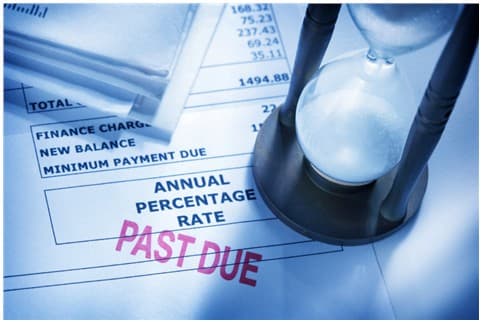- Credit card debt and late payments are on the rise (2rd quarter 2023).
- Take steps to avoid running up credit card debt.
- If you are struggling to pay your bills or have late payments, then look for a debt relief solution.
- Start your FREE debt assessment
Credit Card Late Payments: Take Count
Holiday season means big family meals, buying presents, and taking vacations. There is a big temptation to pull out our credit cards and make another charge, as well as pushing off payments. That means either paying the minimum payment or even worse making a late payment.
According to the New York Federal Reserve press release credit card debt is on the rise and the number of borrowers making late payments (more than 90 days) increased. Here are a few of the 2023 2nd quarter statistics:
- Total credit card debt was more than $1 trillion.
- "Credit cards balances saw the most pronounced worsening in performance in 2023Q2 after a period of extraordinarily low delinquency rates during the pandemic."
Over the past few years many consumers have reined in their credit card debt. However, due to consumer confidence, a better job market, or a desire to make more purchases, the credit card debt rates have risen in the last year. The more troubling part is that more borrowers are not making their payments on time and falling further and further behind.
Credit Card Late Payments – the Consequences
Making late payments on your credit card has a few serious consequences, including:
- Damage to your credit score: Making late payments on your credit cards results in a negative mark on your credit report. Timely payments on your credit report are the most important factor in getting and maintain a high credit score. Remember, a lower credit score means that you will have a harder time getting a loan (auto loan, mortgage loan, new credit card, or installment loan). It also means that if you get a loan you will pay higher interest rates.
- Late fees: Late payments bring with them penalty fees including flat fees and higher interest rates. Those can be very expensive and make your initial purchases turn out to be very expensive purchases.
- Credit card balance cut, canceled and no new credit available: Credit cards can be very important tools to make large purchases or emergency purchases. (It is always advisable to plan ahead and have an emergency fund).
- Legal action: If you don’t make your payments on time, your late payments can turn into a charge-off and collection item. Either the original lender or a third-party collection agency will put on the pressure for the debt to be paid. This means collection calls, letters and potentially lawsuits.
Get Out Of Debt faster
See where your money’s going, make a smarter debt payoff plan, and get debt-free faster with the free Achieve GOOD™ app.
Learn moreCredit Card Late Payments – Deal with your Debt
Credit card late payments can happen to anyone. Emergency medical bills, car repairs, or other sudden expenses are some of the reasons to build up credit cards. Unemployment or loss of income can cut into the ability to make ends meet.
Here are steps to take to make sure you avoid making late credit card payments:
- Create and maintain a budget. Make sure you understand how much you spend so that you can control your expenses. Also, budget property your savings and retirement accounts.
- Create an emergency fund. Make sure that you have at least a 6-month emergency fund, in case you have a loss of income or sudden expensive bills. Your emergency fund is not meant to pay for appliances or vacations. Put those into your monthly budget.
- Avoid minimum payments. By making minimum payments you build up larger credit card debt and greatly increase the amount it really costs to purchase an item. Most credit cards and installment purchases have very high interest rate. Use the Bills.com minimum payment calculator to see how much those purchases really cost you.
If you have already built up high credit card debt, and are making late payments, then it is imperative that you take care of your credit card debt immediately. Finding the best debt relief solution is important, whether it is a cash-out mortgage refinance, personal debt consolidation loan, credit counseling and debt management program, or debt settlement.
In general, if you are struggling to make payments and already have late credit card payments (and maybe mortgage payments too), then getting a new loan is not a realistic option. Late payments and credit card debt can be stressful. Before you sign up for any program, make sure that it is appropriate to your financial situation. Don’t fall prey to high-pressure tactics and avoid making upfront payments for your debt problems.
Free up cash each month with Freedom Debt Relief

Ozzy S., Freedom client
“Right away, I had more money each month because of program costs so much less than what I was paying on my minimums.”
Actual client of Freedom Debt Relief. Client’s endorsement is a paid testimonial. Individual results are not typical and will vary.

